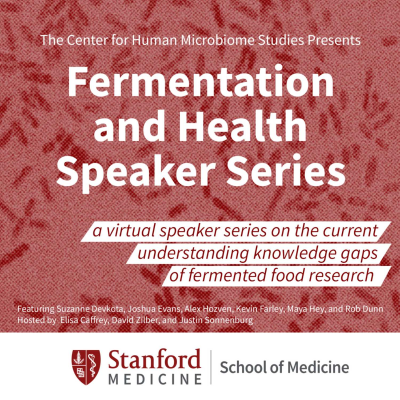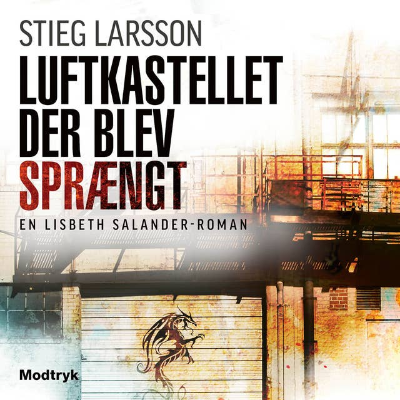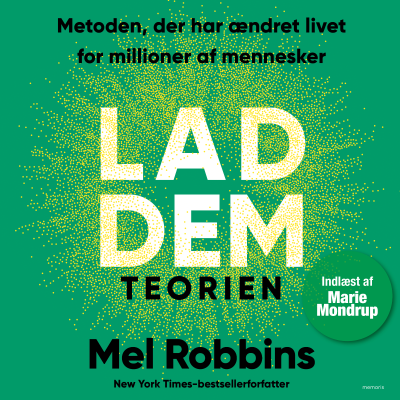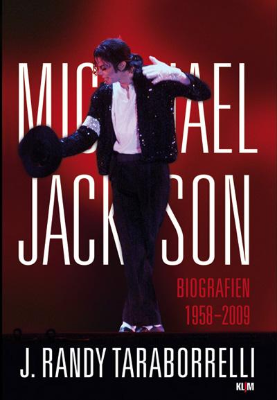
Fermentation Speaker Series
engelsk
Videnskab & teknologi
Begrænset tilbud
2 måneder kun 19 kr.
Derefter 99 kr. / månedOpsig når som helst.
- 20 lydbogstimer pr. måned
- Podcasts kun på Podimo
- Gratis podcasts
Læs mere Fermentation Speaker Series
The Center for Human Microbiome Studies at Stanford University School of Medicine presents Fermentation and Health Speaker Series, led by Elisa Caffrey, David Zilber, and Dr. Justin Sonnenburg. The goal of this series is to create space to have nuanced conversations around the current understanding and knowledge gaps of fermented food research, and act as a platform to define and promote future fermented food and health projects.
Alle episoder
13 episoderMicrobial shaping of arctic foodways: A conversation with Aviaja Hauptmann
We spoke with Dr. Aviaja Hauptmann, an Associate Professor in the Institute of Health & Nature and Head of the Department of SILA (Scientific and Indigenous Teachings on Life in the Arctic). Her work explores the interaction between microbiology, diet, and the environment, focusing on Inuit food microbiomes and Indigenous food sovereignty. She is examining gastrophagy as a way of connecting animal gut, food, and human gut microbiomes. Join our conversation on hybrid fermentation, probiotics, and the open questions in health and fermentation studies.
Fermented Foods, Probiotics, and Lactic Acid Bacteria: A conversation with Maria Marco
Lactic acid bacteria (LAB) play a central role in many fermented foods, including sourdough, kimchi, pickles, olives, zha cai, kefir, ogi, and cheese, among others. These microbes produce lactic acid, which acidifies the fermented food, making it both safe and tasty. Specific LAB strains have also been characterized as probiotics. But how do LAB found in fermented foods differ from probiotics? And what exactly defines a probiotic? We spoke with Dr. Maria Marco, a Professor in the Department of Food Science and Technology at the University of California, Davis. Her lab primarily focuses on lactic acid bacteria in food systems and the mammalian digestive tract. She has authored and collaborated on numerous important papers covering fermentation and health, probiotics, and the future of the fermented food field. Join our conversation on hybrid fermentation, probiotics, and the open questions in health and fermentation studies.
Symbiotic yeast in fermentation: A conversation with Chantle Swichkow
Dr. Chantle Swichkow, a postdoc in Leonid Kruglyak’s lab at UCLA, has been exploring the role of yeast in these symbiotic interactions. By applying her background in mouse genetics to yeast, she studies how yeast strain diversity impacts microbial community composition and the final organoleptic properties of wine, bread, and kombucha. Join our conversation on the history of Saccharomyces, strain diversity in fermented food production, blue Takis, and the power of Reddit.
Exploring microbial metagenomes: A conversation with Paul Cotter
One way to characterize fermented foods is based on where the fermentation microbes come from: either spontaneously acquired from the environment (also known as wild fermentation), from a previous ferment (back-slopping), or from a commercial starter community. But how do we identify which microbes are involved in this process in the first place? Paul Cotter, an Adjunct Professor at University College Cork and Head of Food Biosciences, as well as a Senior Principal Research Officer at Teagasc Food Research Centre, has spent his career addressing this question through tool development, collaborating with a global team of scientists, and exploring the diversity of the fermented food landscape. Join our conversation on mapping fermented food metagenomes, personalized fermented foods, and lab kefir.
Demystifying microbial communities: A conversation with Ben Wolfe
The microbiome of fermented foods, like any microbiome, is a multi-species microbial community and can include a rich mixture of bacteria, fungi, and yeast all in the same fermented food. The presence of a specific microbe cannot always predict the final quality, safety, or flavor of a fermented food, but studying their interactions gives a richer understanding of these community dynamics. Ben Wolfe, an Associate Professor in the Department of Biology at Tufts University has been exploring these microbial ecologies. Using models such as cheese rinds, sterile baby cabbages, and kombucha, his lab investigates the origins of these fermentation community members, how they interact with each other, and how these communities can evolve and diversify over time. Join our conversation on microbial onramps, phage resistance, and purple cheese…
Vælg dit abonnement
Begrænset tilbud
Premium
20 timers lydbøger
Podcasts kun på Podimo
Gratis podcasts
Opsig når som helst
2 måneder kun 19 kr.
Derefter 99 kr. / måned
Premium Plus
100 timers lydbøger
Podcasts kun på Podimo
Gratis podcasts
Opsig når som helst
Prøv gratis i 7 dage
Derefter 129 kr. / month
2 måneder kun 19 kr. Derefter 99 kr. / måned. Opsig når som helst.

































